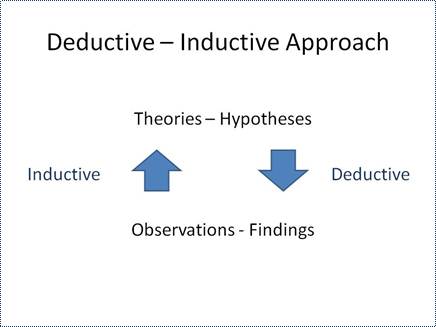| Definition of research and stages of the research process |
| |
|
| What is Research? |
| |
Research can be defined as the application of scientific methods with the overall aim to develop and advance human knowledge. In order for research to have scientific value and to be valid, attention needs to be paid to the development of each stage of the research. It is important that every decision made during the research project is well-justified and that limitations are acknowledged. |
| |
|
| |
The different stages of research usually are: |
| |
- Reviewing the literature, identifying gaps in human knowledge and specifying a relevant research topic
- Formulating research questions and hypotheses
- Developing and phrasing research aims and objectives
- Developing a research proposal which includes the research design, sampling strategies and methods, data collection methods and tools, data analysis plan, ethical consideration, timetable, costing, dissemination strategy
- Applying for ethical approval
- Conducting the research and analyzing and interpreting findings
- Disseminating the results (presentation, paper)
|
| |
|
| |
However, when the researcher wants to conduct research in a total new area where no previous research has been conducted before, the research process may start with data collection instead. |
| |
|
| Research methodologies |
| |
There are currently three research methodologies: qualitative, quantitative and mixed-methods methodologies. The research questions will determine which methodology to apply, however that is not what always happens in practice. In practice, the researcher’s philosophical stand on his/her definition of “truth” often determines the research methodology. |
| |
|
| Why conduct research? |
| |
Research can have different objectives: to explore new knowledge domains, to prevent or solve problems, to develop new theories and applications, to test existing theories, to predict events, to determinate causes, to test applications in different settings or under different circumstance, to reaffirm the findings of previous research, to develop methods to improve efficiency and reduce resources. |
| |
|
| When conduct research? |
| |
Research is an iterative process and is never concluded. This is because every research project has limitations and findings are only believed to be true as long as no other findings are contradicting the previous findings. An example of this is that people used to believe the earth was a flat disk floating in the ocean. Also, research can be repeated in different settings or in different circumstances. In addition, at the end of a research project, more questions will arise that require new research. |
| |
|
| How to conduct research? |
| |
Research can be deductive or inductive. In the deductive approach the researcher starts with a theory or hypothesis and conducts research to test that theory. On the contrary, in the inductive approach the researcher conducts research first and develops a theory based on the findings. |
| |
 |
| |
|
| |
Usually, the deductive approach is associated with quantitative research and the inductive approach is associated with qualitative research. Indeed, approaches to research depend on epistemologies, which are addressed in “Theoretical and philosophical underpinnings of research” [insert link]. However, because research is iterative, longitudinal studies often include both the inductive and deductive approach. |
| |
|
| Who conducts research? |
| |
Scientific research is usually funded by public authorities, by charitable organizations and by private groups, including many companies. |
| |
|
| |
|
| Theoretical and philosophical underpinnings of research |
| |
|
Two terms underpinning research philosophically are epistemology and ontology.
|
| |
|
| Epistemology |
| |
Epistemology is the theory of knowledge. It is concerned with the nature and scope of knowledge and is concerned with questions related to how one thinks knowledge or truth can be comprehended, what knowledge is and how it is acquired. |
| |
Two strands within epistemology are positivism and interpretivism. |
| |
Positivism is a paradigm that holds that knowledge is based on natural phenomena and their properties and relations are verified by the empirical sciences. This paradigm is related to quantitative research. |
| |
Interpretivism is the contrary paradigm to positivism. Interpretivists believe that social sciences are fundamentally different from natural sciences and therefore the social world cannot be studied by applying scientific models of natural sciences. |
| |
|
| Ontology |
| |
Ontology is the philosophical study of the nature of reality and is concerned with questions related to how one thinks about reality and about what exists in fact and in thought only, what can be said to exist, into what categories, if any, can we sort existing things and what are the meanings of being. |
| |
Two strands within ontology are objectivism and constructivism. |
| |
Objectivism is an ontological position that implies that knowledge is objective, independent of the social context and measurable. |
| |
Constructivism, on the contrary, is an ontological position that implies that knowledge is constructed by people and that realities do not exist objectively. No reality exists except that constructed through the individual or collective definition of the perceived situation. This paradigm is related to qualitative research. |
| |
|
| Quantitative versus qualitative methodology |
| |
|
| |
|
Quantitative |
Qualitative |
Epistemology |
Positivism |
Interpretivism |
Ontology |
Objectivism |
Constructivism |
Approach |
Deductive |
Inductive |
Focus |
Testing of specific hypotheses that are smaller parts of some larger theoretical perspective |
Social processes and individual experiences |
Model |
Follows a traditional natural science model: experimental design, quasi-experimental, representative sample |
Conducted in natural setting: case study, phenomenology, biography, ethnography |
Emphasize |
Standardization, precision, objectivity, reliability, replicability, generalisability |
Real, rich, deep and personal data, “thick description” |
|
| |
|


